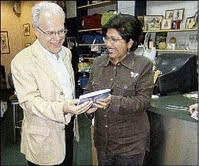 My Dad - Joscelyn E. Lowrie FCA
From 'Souldance'
My Dad - Joscelyn E. Lowrie FCA
From 'Souldance'
There was great excitement in our house that week. My mother, a widowed young mother of four running a grocery shop in Savanna-la-mar, was baking a wedding cake for Uncle Jos’ big day. Uncle Jos, a relative of our late father, would travel regularly from Kingston where he worked as an accountant, taking us to his beloved St. Joseph’s Catholic Church at Hendon Circle, and bringing us fun gifts.
All week we kept asking, “Who is Uncle Jos getting married to? When can we meet her?” My mother told us he was marrying a lady named Miss Jones and that we would meet her on the wedding day.
On the long awaited day my sister and I were sent next door for our neighbour, Miss King, to help us get dressed.
Miss King, an elderly spinster, seemed extremely excited. “What a happy day!” she exclaimed, “Your Mama is getting married to your Uncle Jos!” Frances and I looked at each other in bewilderment, but I was secretly relieved. I had been worried that “Miss Jones” would not approve of Uncle Jos bringing us stuff like hula-hoops and big American apples from Kingston.
Uncle Jos, our new Dad had encouraged our mother to enrol us at the private Catholic School and we had become converts. The Sisters of Mercy at St. Mary’s Academy admired my father greatly, this brilliant young accountant who took such interest in the education of his stepchildren.
A year after the wedding, when Dad had found a suitable house to rent, we journeyed together to begin a new life in Kingston. He was in accord with our mother that God should always be at the centre of our lives. Prayers were said before meals and at bedtime. We worshipped every Sunday at Holy Cross and attended Alpha Prep then Alpha Academy while our brother Tony went to St. George’s College.
Dad threw himself into the role of father with a gusto that I have rarely seen in biological fathers. Every Saturday was library day, and after we carefully selected our books, we would be taken to the old Oxford Pharmacy for ice cream. No wonder we all went into communications – he made the written word sweet for us!
Our school reports were filed with the same military precision he used for his office papers. He used the files to track our progress or lack thereof in various subjects.
But this calm organized Dad had one great aversion: he could not countenance borrowing. The only two times I was punished by him was for borrowing playthings. He measured out the slaps; four in each hand and forever made me allergic to borrowing.
Our father worked with one of the city’s leading accounting firms, and continued studying at night. There was great jubilation when he passed his final examinations to become a chartered accountant. We treasure the Gleaner clipping carrying pictures of him and his good friend Edgar Jones announcing their success.
Dad set up his own firm but an arthritic condition that started years before, when the English winter seeped into his young bones as he served in the RAF in World War II, flared up with dire consequences. By the time he was 40, my father was confined to a wheelchair and moved his office to our small living room in Pembroke Hall. All the dreams he had of moving us to a “better” neighbourhood, had to be put on hold.
Instead of losing faith, this illness drew my father and the entire family closer to God. Every night we would gather around his bed, and say the Rosary, each of us taking turns to lead a decade. Once during prayers, he gasped and stopped breathing. We prayed more loudly, urged on by our tearful mother, until he started breathing again.
My father confounded his doctors, who wondered how he could continue working full time, retaining almost all his clients although he was constantly in pain. The bones in his neck had fused so he was not able to look down at his writings. He was fitted with periscope-like glasses and kept right on earning and supporting his family.
It was from Dad that we learned good office practice. He refused to put his signature on any letter that was smudged by an eraser. His files had to be orderly, every sheet of paper punched so that the pages were edge to edge.
Our father worked to the day before his death in 1977, and left this world whispering prayers with my mother.
The week before he died, he signed the papers for his youngest to go to University. The month before, he had made his final mortgage payment. “All is now in order,” he had told our mother. “I can die now.”
The late Sister Veronica Doorly wrote in her letter of condolence, “We now have St Joscelyn in heaven.” On the wall facing my desk, is a photograph of Dad – warm, calm, and true. He is our Angel.




